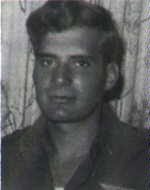Epstein, Eliyahu-Yitzhak (“Eli”)
Son of Moshe and Rachel. He was born on December 16, 1946 in Tel Aviv. He attended the Kalir Elementary School and the biological track at the “Kol Yisrael Haverim” high school in Tel Aviv. He excelled in mathematics, chemistry and physics, and was a diligent, quiet, disciplined boy. The principal of the high school remembers him as a student who did his work faithfully. He did not go big and did not pursue honor. He was modest and contented himself with little. Although he was interested in studying in a biologically realistic direction, he was fascinated by art. He loved music and painting, was an amateur photographer, played the accordion and studied at the conservatory for three years. He often visited concerts and exhibitions. He had a large collection of classical music records and modern music. Also in his room, at the base of Sinai, was a collection of artistic photographs which he collected from illustrated magazines. After graduating from high school, he was accepted to the academic reserve, received a deferral of service and moved to Jerusalem to study microbiology and genetics at the Hebrew University. He was very interested in the studies and spent many hours in the labs, so he decided to specialize in microbiology and continue his studies toward his master’s and master’s degrees. His friends testified that he was a diligent student, and a good friend who was willing to help others. Once he was offered an interesting scientific work at the hospital laboratory in Jerusalem, but he decided to give it to one of his friends in the faculty, who needed money. In the summer of 1967, he received a graduate degree in natural sciences and separated from his friends, teachers and laboratories for the duration of his military service. He completed a course for class commanders and a basic officer course during summer vacations, as part of the academic reserve. He participated in the Six-Day War in the campaign to liberate Jerusalem. On the first night of the war, he was part of the aid force and the Armored Corps soldiers who occupied the radar posts in West Jerusalem. The next day he fought in Abu Tor and the village of Shiloah and was one of the first burglars to Jerusalem with the Jerusalem Brigade in the early hours of the 26th of Iyar in the summer of 1967. In the summer of 1967, when he enlisted in the regular army, He was promoted to the rank of lieutenant, served as a battery commander and also attended a front-line officers’ training course. In the incidents of fire with the Egyptians, he successfully managed and managed the fire of his battalion’s battalions, having acquired considerable experience and knowledge in art battles Yelaria began to serve as a battalion operations officer, a punctual officer, and he invested himself in solving difficult problems of complicated situations, worked hard and excelled in operations, and one of them was lightly injured. He was so dedicated to his subordinates that he seldom came from the front of the canal for a vacation at his parents’ home in Ramat Gan, and used to give up vacations for his colleagues who had family. Once he even gave up on a Passover seder so that his friend would arrive at his home in the far north and would be able to celebrate the seder with his family. He did not tell his family about his duties and the tasks he took part in, and he would protest the family’s concern for the smile on his face. The heavy fire incidents in the canal and his fallen friends became known to his parents only after his death. On Sunday, March 13, 1969, he fell while serving in the Suez Canal area and was brought to rest in the military cemetery in Kiryat Shaul., Edited by Yehuda the Civil and published by the Hebrew University of Jerusalem and the Student Union, brought the story of his life and death
